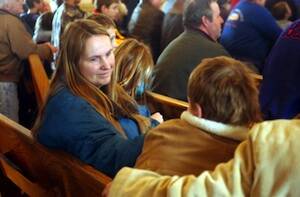Past studies have shown that those who attend religious services at least weekly tend to live longer and healthier lives. Now, new research indicates that frequent churchgoers also face those additional years with more optimism and greater social support than other people. A study involving more than 92,000 postmenopausal women showed that those who reported weekly attendance at religious services were 56 percent more likely to be above the median in terms of their optimism level. They also were significantly less likely to be depressed or characterized by cynical hostility. The study was published in the Journal of Religion and Health on Nov. 11; the research was conducted by a team led by Eliezer Schnall, a clinical associate professor of psychology at Yeshiva University in New York. Schnall said his research team postulated that “maybe there could be some social strains having to do with religious identification or networks or associations,” but the research did not support this hypothesis.
Churchgoers Show More Optimism
Show Comments (
)
Comments are automatically closed two weeks after an article's initial publication. See our comments policy for more.
The latest from america
Donald Trump and Volodymyr Zelenskyy met inside St. Peter’s Basilica ahead of the funeral for Pope Francis on the morning of April 26.
Cardinal Giovanni Battista Re’s homily for the funeral of Pope Francis.
The day before he died, Pope Francis made one final circuit through St. Peter’s Square in his popemobile. “That’s my last image of him alive,” Gerry O’Connell remembered. “He drove among the people.”
Universities need to change. But Trump is attacking the wrong problems.








